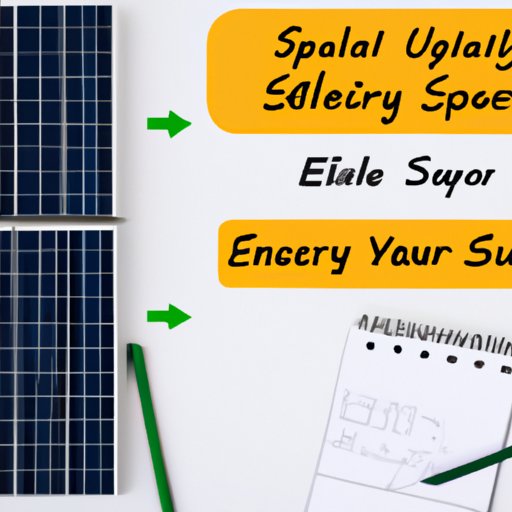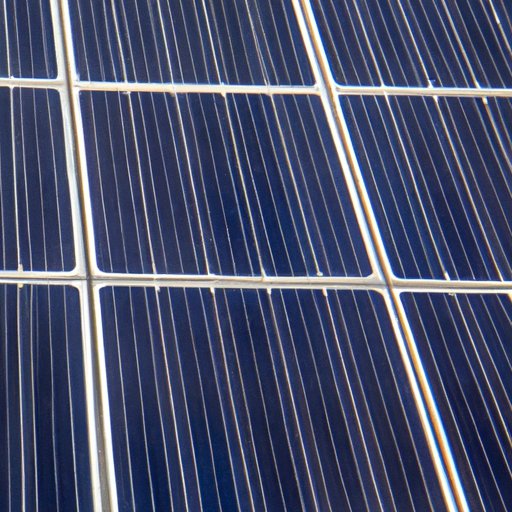Introduction
Solar power is quickly becoming an attractive option for homeowners who are looking for a sustainable and cost-effective source of energy. However, one of the most essential questions that homeowners ask when considering solar power is how many solar panels they need to power their house. In this article, we’ll provide a comprehensive guide to help you understand how to determine the number of solar panels required for your home.
Determining the Energy Needs of Your Home: Understanding Your Energy Consumption
Before deciding how many solar panels you need, it’s crucial to understand your energy consumption. Energy consumption refers to the amount of energy that your household uses each day and is measured in kilowatt-hours (kWh). Understanding your energy consumption will help you determine the number of solar panels required for your home accurately.
You can analyze your past electricity bills to determine your daily energy consumption. This is a great starting point for understanding how much power you need daily. You can also calculate the wattage of your appliances and devices to obtain a better understanding of your energy consumption and optimize your solar panel system.
Sizing Your Solar Panel System – Things to Consider
When determining the number of solar panels required for your home, you must consider several factors. These include the square footage of your home, the number of windows, the location, and any extra backup power systems you might require. Backup power systems often require larger solar panel systems.
Backup systems should be considered if you live in an area that experiences frequent power outages or if your home requires a large amount of power. The more backup power you require, the more solar panels you’ll need to install.
How Many Solar Panels Do You Need? A Step-by-Step Guide
Now that you understand your energy consumption, and you’ve considered several factors, you can calculate the number of solar panels required for your home. A professional installer should always double-check these calculations.
First, determine your energy needs. Calculate your home’s average daily electricity consumption, and then divide that number by the electricity output per solar panel. This figure will vary depending on the type of solar panels you select, your location, and other factors. Professionals can help you determine the right number for your home easily.
Next, you will need to consider your location. Different regions receive different amounts of sunlight. For example, an area that receives more sunlight than others will require fewer solar panels. You will need to consider your region’s solar resource potential to calculate accurately. Installers will often use a solar panel calculator to provide a rough estimate, again ensure to double-check.
The Environmental Benefits of Solar Power for Your Home
Solar power isn’t only a cost-effective option, but it also has several environmental benefits. Using solar power reduces carbon emissions, greenhouse gases, and air pollution. By replacing fossil fuels with renewable energy sources like solar energy, homeowners can contribute to building a more sustainable future.
This shift to renewable energy is essential given the environmental challenges we face in modern times. It’s predicted that renewable energy will comprise nearly 80% of the world’s energy production by 2050. For this reason, it’s important to continue to encourage homeowners to take up renewable options like solar power.
Factors Affecting the Number of Solar Panels Required for Your Home
Several factors can affect the number of solar panels required to power your home successfully. The orientation of your solar panels, the presence of shading, and the local climate are just a few examples of factors that can affect the efficacy of your solar panel system.
To optimize your solar panel system, it’s important to address these factors as much as possible. For example, a professional installer may recommend using microinverters, which allow panels in shaded parts of the roof to function effectively by optimizing the output of each panel.
The Cost and Financial Benefits of Going Solar: A Comprehensive Study
While the cost of installing a solar panel system can be high, the financial benefits of going solar can more than make up for it. Federal and state tax credits can help you reduce the cost of installing solar panels by up to 30%. You can also benefit from net metering, which allows the utility company to take the excess energy that your solar panel system generates and give you credit on your electricity bill. This means that you can earn money from the energy you produce.
Solar power might seem expensive upfront. However, in most cases, it’s more cost-effective over time compared to traditional energy sources in the long run. You can save thousands of dollars on electricity bills over the lifespan of your solar panel system, which can be between 25 to 35 years.

Tips for Maintaining Your Solar Panels and Lowering Your Overall Energy Consumption
Maintaining your solar panels is essential to ensure they function effectively. Regular cleaning ensures that they are free from any dirt or debris that might affect their output. You can also install smart monitoring systems which allow you to monitor your solar panel system’s performance to ensure that it is producing electricity efficiently.
Lowering your overall energy consumption is another way to benefit from using solar power. Using energy-efficient appliances and changing your daily habits are just a few ways to lower your energy consumption.
Conclusion
We hope this article has provided a comprehensive guide on how to determine many solar panels required to power your home. When considering going solar, several factors must be considered, including orientation and climate. Understanding your energy consumption and choosing the right solar panels is essential to ensure that your system produces electricity efficiently.
Remember to hire a professional installer to ensure that your solar panel system is installed correctly. If you seek to lower your energy bills and contribute to a more sustainable future, Solar power can be an excellent option for homeowners looking to make more economical and sustainable lifestyle choices.
